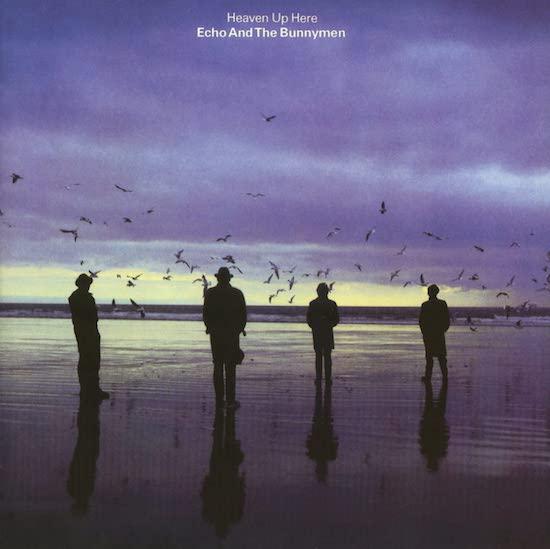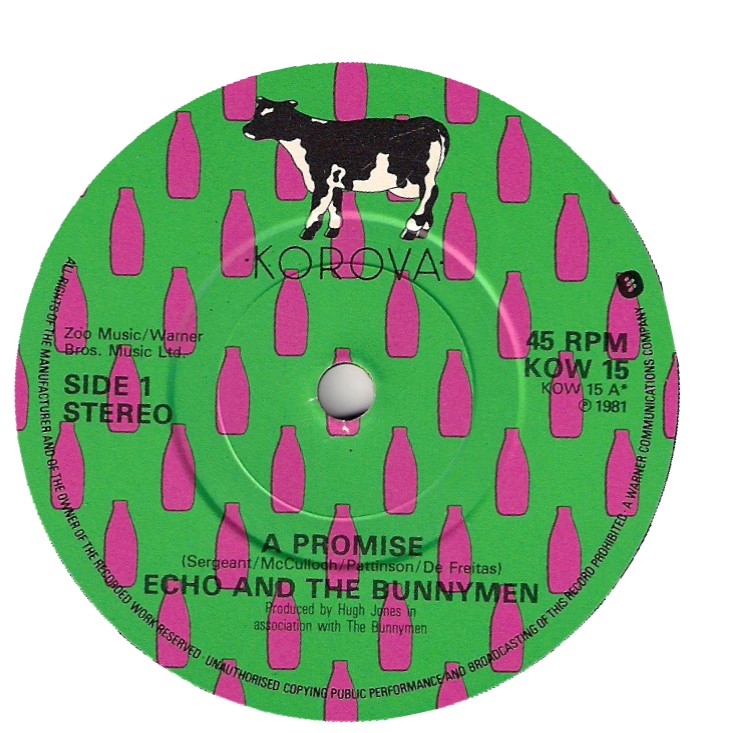Let’s address the name of the band first, shall we?
Well, it turns out there is no special or cerebral hidden meaning if we are to believe Will Sergeant, the lead guitarist, it was just a stupid name in a long list of stupid names suggested by a mate of the bands. We could have had The Daz Men, or Glisserol And The Fan and it is just, I guess, the passage of time that makes the alternatives sound ridiculous and Echo And The Bunnymen sound like they were destined to be called that from day one. No doubt fans around the world inferred their own meanings in the name – in any case, it’s hard to imagine them being called anything else. Like a child’s personality fitting their name, the band’s music and the name of the band go hand in hand.

Heaven Up Here was released on Korova in 1981 and was, by all measures, a success – a top 10 album in the UK, an entry in the US Billboard album charts, and it spawned two singles, A Promise and Over The Wall.
The album opens with Show of Strength , simple bass and drums featuring heavily which grabs the listener’s attention and accompanies them throughout the song – lots of post-punk influences in here, and lots that have influenced others. If you are like me and just can not help compare tracks to other music and bands (the older I have got the more this tends to happen – it’s a curse!) then there are definite Bruce Foxton elements in the bass when the middle eight kicks in, or maybe the third quarter eight if there was such a thing – a Jam style simplistic thumping bass over the vocals. I think the music fade out at the end of this track, leaving the vocals to end the song, is unexpected and makes, in my opinion, a good, but ordinary track into something that whets the appetite for the rest of the LP.
OK, it has passed the first test – the opener needs to intrigue the listener and leave them wanting more and I think Show of Strength does just that. So on to With a Hip, and I’m sorry, I can’t help it, but The Jam springs to mind again with the fade-in and the bass being a hybrid of Tubestation and Start! – this is no bad thing, of course.
It is Ian McCulloch’s vocals, and to a lesser degree Will Sergeant’s lead guitar, that lean towards the role of influencer as opposed to the influenced. For example there is a hint of Johnny Marr in some of the lead guitar here, and given The Smiths were a year away from debuting that isn’t really a surprise. McCulloch and Marr would go on to work together in 1993.
With a Hip is short at 3:16, and a bit too short I fancy, as it’s a great track. But make way it does for Over The Wall, the second most listened to track off the album according to Spotify figures, and of course one of the singles. The indies do like their fade-ins in the 80s and this one starts with just that, and guitaring that could not be from any other decade. Over The Wall places this album firmly in the 80s if you were ever in any doubt from the previous tracks. With a Jim Morrison vibe to McCulloch’s vocals on this one, I think if you slipped this track onto the Apolopyse Now soundtrack nobody would notice (the chorus aside maybe). Fans of The Waterboys are also on familiar territory here, both bands attempting to be anthemic and definitely underatted from that era. Over The Wall is double the length of With a Hip but still seems to end too soon. Perhaps we’re spoiled nowadays with the unshackling and derestricted nature that digital media allows.
It Was a Pleasure is sandwiched between the two singles, and feels slightly out of place – is it fair to say it’s a filler? All sandwiches need a filling right? It’s over before you know it and we’re into the last track on side A, A Promise.
There is a melody to A Promise absent from the rest of side A. Dare I say it’s a jollyer song despite the ever present, slightly depressing tone of the vocals, but I’d say this is the most crafted song on the album so far and finishes the side well.

Side B starts off with the frantic Heaven Up Here (I’m pretty sure Haircut 100 stole the opening riff) and its the busiest track so far – again we hear simple bass lines Andy Rourke would have been pleased with, but its a great track with an abrupt ending you’d have been requesting at the local indie disco as the most dance floor friendly Bunnymen song off the album.
The Disease slows things down again and, yes, another fade in. It’s fairly unremarkable and slightly experimental with vocal effects, and at 2:27 is over quickly enough. All My Colours opens with a prominent drum beat and vocal, drums really taking the lead for the first minute or so and is a constant throughout, with the other instruments coming and going. It has an atmosphere this song, melancholy is probably a good word to describe it. One to close your eyes to.
McCullochs vocals don’t really lend themselves to upbeat or optimisitic, but No Dark Things attempts it nonetheless. It’s positively jaunty compared to All My Colours but still very Bunnymen and angsty. That’s what you’re getting here, by the way, across the album, angst. Just want to make that clear!
The penultimate track, Turquoise Days, strips things down a little, and is again a short one. This track more than the others ends too soon. It is building up to something and then just ends – I feel Echo and The Bunnymen would have been better suited to a 2 or 3 track per side album, where they could really have created something interesting. Their style, in my opinion, doesn’t really lend itself to the 3 minute 30 pop song length.
Ending with All I Want we’re treated again to Haircut 100 type opening riffs which seem a little out of place, but the drumming in particular on this track is up there with the best of the album. It’s a strong ending, and I think this would have made a better single than certainly A Promise if not Over The Wall. Again though, it ends too soon. All tracks here are several minutes too short which just wouldn’t happen if they released this music today.
This album is a good album, I want to leave you with that. It really sums up a decade and is pure 80s indie post-punk, but it also suffers a little from that. It’s very angst driven, as I have said, and all a little bit too intense. It’s slightly exhausting. Depending on your mood you’ll either flip it over and start again, or dig out your copy of Crocodiles to continue the theme, or you’ll have been reminded of Haircut 100 and put on Love Plus One at full volume as an antidote to the intensity.
